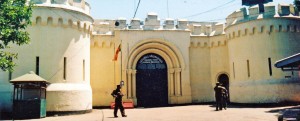Sunday Times 2
Bogambara: From historic prison to National museum and cultural complex
View(s):By S.W.R. de A Samarasinghe
The Mahanayaka of the Malwatta Chapter Ven. Thibbatuwawe Sri Sumangala thero and the Mahanyaka of the Asgiriya Chapter Ven. Warakagoda Gnanarathana thero have urged the government to conserve and use the 140 year old Bogambara Prison Building Complex (1876) in Kandy for a national museum and cultural centre that would serve as a major resource for the advancement of the heritage of Kandy which is already a UNESCO World Heritage City. In a letter addressed to President Maithripala Sirisena and Prime Minister Ranil Wickremesinghe, both have expressed their strong opposition to any proposal to build a luxury hotel or shopping complex, as some appear to have suggested.

The Bogambara prisons: The Mahanayakes seek its preservation as heritage site
The two prelates have also sent the President and Prime Minister a project proposal that a group of scholars, experts and professionals have prepared for them under the guidance and advice of the prelates. The proposal advocates the conservation and redevelopment of the main building that occupies almost six acres of land, and using the remaining seven acres of Bogambara for ancillary facilities. One of the main goals is to create a modern world-class national museum in Kandy. A small prison museum will also be created. The rest of the building will be used for a cultural complex that will accommodate Kandyan arts and crafts, an auditorium, a performing arts facility, art gallery, an ayurveda spa, food court and other ancillary facilities that would attract local and foreign visitors. A small luxury boutique hotel too could be accommodated.
1818 rebellion
The prelates point out that the bicentenary of the 1818 Kandyan rebellion falls next year. Recently President Maithripala Sirisena declared the nineteen rebel leaders, who were called âtraitorsâ by the British, national heroes. The head priests point out that the establishment of a national museum and cultural complex in Bogambara would be a fitting tribute to the heroes who led not so much a rebellion but the first battle for Sri Lankaâs independence that was finally realized 130 years later in 1948.
Financing
The Bogambara project proposal estimates that the initial investment for conservation and redevelopment would cost around Rs.1,000 million to Rs.1,500 million ($7 to 10 million). It recognises that the government is currently facing a very tight budget and may not be able to spare the funds for such a project. A strong diplomatic effort on the part of the government should be able to raise the funds from countries such as Britain, Netherlands, India and other major donors who have strong historical and religious links to Kandy.
The running cost can be met with entrance fees and earnings from other facilities in the proposed complex. For example, in 2015 about 620,000 foreign tourists visited Kandy. If only 100,000 visitors come to the proposed complex and each pays Rs. 500 for entry, the annual total revenue would be Rs.50m. The goal should be to make Bogambara a âmust seeâ destination for visitors, both local and foreign. That would ensure a good revenue stream for upkeep and future development. It will also encourage more foreign visitors to spend an extra night in Kandy where, now, 80% of them spend only one night.
Ethnic amity
It would be a disservice to measure the potential benefits purely in monetary terms. There are also substantial non-monetary benefits to be derived from Bogambara. A top-notch museum will be a great resource to educate the present and future generations about the 800-year history of the Kandy region. It will also capture the international flavor of Kanda Udarata that welcomed people from other backgrounds including Muslim traders who had to flee Portuguese persecution in the west coast and sojourners such as the Englishman Robert Knox, not to mention colonial planters and South Indian workers. Most importantly, the museum will serve as a conduit to the past when people of different ethnicities lived in Kandy in harmony under Kandyan kings, an important lesson that the present generation can learn to achieve national reconciliation.

